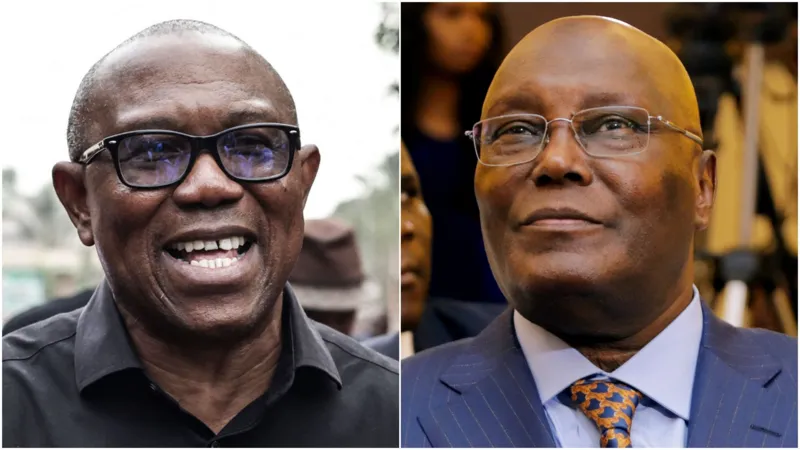In a dramatic shift in Nigeria’s political landscape, opposition heavyweights Atiku Abubakar and Peter Obi have joined the African Democratic Congress (ADC) as part of a new coalition aimed at unseating President Bola Ahmed Tinubu in the 2027 general elections.

Both leaders have formally severed ties with their former parties—Atiku from the Peoples Democratic Party (PDP) and Obi from the Labour Party (LP)—marking one of the most significant political realignments since Nigeria’s return to civilian rule in 1999.
A United Opposition Front
The formation of this coalition follows months of strategic talks to avoid splitting the opposition vote—a major factor that helped Tinubu clinch victory in 2023 with just 37% of the votes. Then, Atiku secured 29%, while Obi garnered 25%. Obi had earlier defected from the PDP after Atiku was chosen as the party’s presidential candidate.
Speaking at the coalition’s unveiling, ADC interim chairman and former Senate President David Mark framed the alliance as a patriotic move to safeguard Nigeria’s democracy and halt the drift toward one-party dominance.
Internal Turmoil and Strategic Repositioning
Both the PDP and Labour Party have been battling internal divisions, which many observers attribute to external political interference. Political analyst Shehu Iliyasu believes Atiku and Obi are responding to the lessons of the last election.
“They now realise that a united ticket in 2023 might have won. This coalition is their way of correcting that mistake,” Iliyasu told the BBC.

Who’s Backing the Coalition?
Atiku and Obi are the public faces of the new alliance, but several other political heavyweights have joined the fold. These include former PDP national chairman Uche Secondus, ex-Senate President David Mark, former Kaduna governor Nasir El-Rufai, and former Transport Minister Rotimi Amaechi—once a key ally of Tinubu.
Although official candidacies have yet to be declared, political watchers speculate that Atiku, now 78, may run for president again with Obi, 63, as his running mate—mirroring their 2019 ticket under the PDP.
ADC: An Old Party With New Momentum
The ADC is not a new party. Originally formed as the Alliance for Democratic Change in 2005, it later became the African Democratic Congress upon registration with the Independent National Electoral Commission (INEC). The name closely resembles the All Democratic Alliance (ADA), the name the coalition had initially hoped to register.
Registering a new party in Nigeria is notoriously complex, requiring presence in at least 24 states and a headquarters in Abuja. According to ADC official Jamilu Danladi, this was why the group opted for an existing platform.
Despite its relatively low profile, the ADC has built a solid national presence. Its 2023 presidential candidate, Dumebi Kachikwu, finished fifth, and the party currently holds two seats in the House of Representatives. Its first presidential flagbearer, Professor Pat Utomi, helped elevate the party’s visibility due to his stature as a respected economist.

Can Atiku and Obi Truly Collaborate?
One major question is whether Obi’s supporters—many of whom rallied around his independent candidacy in 2023—will accept his return to a vice-presidential role. It was this concern that led Obi to leave the PDP in the first place.
On the other hand, Atiku’s loyalists argue that as the only former vice president in the race, he is the natural candidate for the top job.
Their previous collaboration in 2019 ended in defeat to President Muhammadu Buhari. However, their 2023 campaigns were largely respectful, with neither attacking the other publicly—a factor analysts believe could help smooth their renewed partnership.
What Are Their Chances in 2027?
Political analyst Ben Kenneth believes the coalition stands a stronger chance in 2027 than either Atiku or Obi had individually in 2023.
“Combined, their vote shares in 2023 exceeded Tinubu’s. If they maintain unity and strategy, this could be a winning ticket,” he said.
However, another analyst, Sani Hamisu, argues that Tinubu may be harder to beat in 2027.
“In Africa, sitting presidents rarely lose re-election bids. Now that Tinubu is in office, he has the advantage of incumbency,” Hamisu noted.
Tinubu’s Second-Term Bid
The APC has already endorsed President Tinubu for a second term, though questions about his health persist. He will be 75 in 2027 and 79 by the end of a potential second term. While recent foreign trips have sparked speculation about his health, the presidency insists he remains fit and capable.
The APC remains dismissive of the ADC coalition. Acting national chairman Ali Bukar Dalori told BBC Hausa that the new alliance poses no threat.
“Nobody outside Abuja is talking about this coalition. Even in Abuja, they’re in a hotel. Once they lose the election, they’ll disappear,” he said.
Impact on PDP and Labour Party
The emergence of the ADC coalition has dealt a significant blow to both the PDP and LP. With Atiku’s exit and other key figures defecting, the PDP risks losing its standing as the country’s main opposition party.
Analyst Iliyasu Hadi sees the writing on the wall.
“Given the calibre of leaders joining the ADC, it’s only a matter of time before it eclipses the PDP as Nigeria’s main opposition,” he said.
The Labour Party, meanwhile, faces a major setback with Obi’s departure. His 2023 campaign transformed the party’s relevance, and many doubt it can sustain that momentum without him.
Despite this, both parties still control 11 states combined, which could serve as a strategic advantage—unless their governors decide to jump ship as well.




